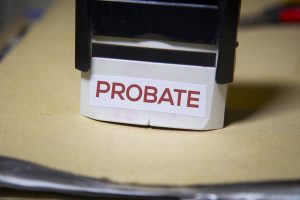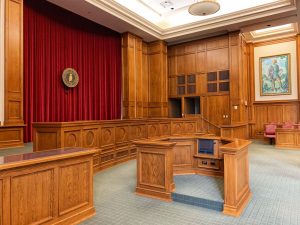Inside the Courtroom: What Happens During a Probate Hearing??

In 2021, court hearings may look a little different than you expect. But whether the hearing is on Zoom (or another video conference platform) or in-person – here is what you can expect:
A hearing in a probate case is an opportunity for your attorney and any other parties to communicate with the judge about what is happening in the case. Throughout the probate process, your attorney may have several hearings with the assigned judge or most of the process may be completed through the submission of the documents to the court. Whether your case has more hearings may depend on the details of the case, how complex the case is, how many parties are involved, or even which judge is assigned to your case.

Reasons for A Hearing During Probate
The probate process begins with a Petition for Administration of the case and usually involves asking the court to admit a Last Will and Testament or to proceed intestate. These hearings are generally pretty quick unless there is an issue or dispute regarding the administration of the case or the appointment of the Personal Representative. If there is no dispute, the attorney will just confirm the information in the petition and answer any questions or concerns the judge may have about granting the petition.
If there is a dispute, such as if one party is trying to admit a Will and another party is trying to prevent that Will from being admitted into probate, this hearing will likely be more in-depth and take longer. A hearing with a dispute about a Will or about who should be appointed as the Personal Representative of the Estate may include testimony from the witnesses to the Will signing, testimony from the attorney who drafted the Will or testimony about the testator’s state of mind at the time the Will (or Trust) was executed.
If the hearing includes testimony about a disputed topic, the different parties will be allowed to present their witnesses. Generally, the party bringing the witness will be permitted to ask questions of the witness first, followed by cross-examination questioning of the same witness by the opposing party. The judge may also ask questions of the witness. It is of course important to remember that any testimony will be given under oath and must be truthful.
One thing that may be surprising for some people is that probate hearings often take place in the Judge’s chambers rather than a full, traditional court room. The room will have a long table with the judge sitting at one end and the opposing parties sitting on either side of the table.
Another reason for a hearing is for opposing parties to present their legal arguments. For example, there may be a dispute over whether an individual was or was not an heir of the estate. The hearing for the dispute of an heir may include the attorneys presenting arguments to the judge about the issue. Typically, these types of hearings will follow the submission of a motion or petition and/or a memorandum to the court. These documents convey ahead of time to the judge what the dispute is about. The attorneys will have conducted research and will use previous cases that have been decided to emphasize their argument. The precedential cases will aid the judge in determining how to rule on the dispute. The judge may issue their ruling on the dispute orally at the hearing or may decide to issue a written opinion after the hearing.
A hearing on a dispute in probate may include both the testimony of witnesses and argument by the attorneys or it may include only testimony or argument. Make sure that you know what the purpose of the hearing is and whether you need to attend.
Reasons for A Hearing During Probate
The probate process begins with a Petition for Administration of the case and usually involves asking the court to admit a Last Will and Testament or to proceed intestate. These hearings are generally pretty quick unless there is an issue or dispute regarding the administration of the case or the appointment of the Personal Representative. If there is no dispute, the attorney will just confirm the information in the petition and answer any questions or concerns the judge may have about granting the petition.
If there is a dispute, such as if one party is trying to admit a Will and another party is trying to prevent that Will from being admitted into probate, this hearing will likely be more in-depth and take longer. A hearing with a dispute about a Will or about who should be appointed as the Personal Representative of the Estate may include testimony from the witnesses to the Will signing, testimony from the attorney who drafted the Will or testimony about the testator’s state of mind at the time the Will (or Trust) was executed.
If the hearing includes testimony about a disputed topic, the different parties will be allowed to present their witnesses. Generally, the party bringing the witness will be permitted to ask questions of the witness first, followed by cross-examination questioning of the same witness by the opposing party. The judge may also ask questions of the witness. It is of course important to remember that any testimony will be given under oath and must be truthful.
One thing that may be surprising for some people is that probate hearings often take place in the Judge’s chambers rather than a full, traditional court room. The room will have a long table with the judge sitting at one end and the opposing parties sitting on either side of the table.
Another reason for a hearing is for opposing parties to present their legal arguments. For example, there may be a dispute over whether an individual was or was not an heir of the estate. The hearing for the dispute of an heir may include the attorneys presenting arguments to the judge about the issue. Typically, these types of hearings will follow the submission of a motion or petition and/or a memorandum to the court. These documents convey ahead of time to the judge what the dispute is about. The attorneys will have conducted research and will use previous cases that have been decided to emphasize their argument. The precedential cases will aid the judge in determining how to rule on the dispute. The judge may issue their ruling on the dispute orally at the hearing or may decide to issue a written opinion after the hearing.
A hearing on a dispute in probate may include both the testimony of witnesses and argument by the attorneys or it may include only testimony or argument. Make sure that you know what the purpose of the hearing is and whether you need to attend.
What to Know if You Have to Attend a Probate Hearing
It is likely that some of you have never attended a court hearing before and some may have experience with attending a hearing. Either way, if you have to attend a probate hearing, what do you need to know?
First, as we would recommend with almost any kind of hearing, you are expected to dress and act professionally. If you are unable to wear typical courtroom attire, like a suit, at least try to wear business casual attire. The courtroom is a professional setting, and it is important to adhere by a professional dress code. The same goes for a hearing that will be conducted by a videoconference. . . you still need to present yourself professionally.
If you are attending the hearing because you will be giving testimony, make sure that you discuss with your attorney the etiquette for speaking in court. Generally, you should not speak unless you are being spoken to. If you are attending a court hearing by Zoom or another platform for video conferencing, ensure that you know how to use the technology. If you have never used the video conference platform before, it may be worth your time to test out the technology before the hearing to ensure that you know how to turn your camera and microphone on and off.
Before you go to a hearing. . .
You should discuss with your attorney what your role at the hearing is, whether you are attending just to observe or if you are expected to give testimony. One of the reasons that you hire an attorney to represent you is for their expertise, so listen to their guidance on whether you need to attend the hearing.
As a rule of thumb, the more complicated a case is, the more hearings there will need to be. This is so because the judge will want to clarify any disputes or misunderstandings prior to making rulings. However, a judge may simply require more hearings even in a seemingly straightforward matter.
Scheduling hearings has to take in to account the schedule of the judge and the other parties involved in the matter. Typically, judges will have times/days set aside for shorter hearings and other times or days for longer, more in-depth hearings. Your attorney will communicate with the judge’s staff and the other parties to schedule a hearing.
If you have would like more information about the process and types of hearings your probate matter may require, please contact Stivers Law. We are happy to schedule a time for you to speak to us about your potential case.



